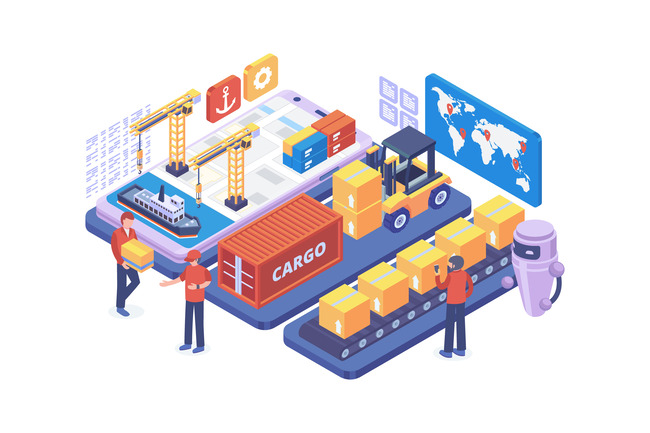Are you looking for the most optimal way to implement artificial intelligence in your supply chain management operations? Here’s a detailed discussion of the top use cases, integration strategies, and challenges that come as a “package” with the implementation of AI!
The use of artificial intelligence in the supply chain management industry has grown by a surprising amount compared to the last decade, and it continues to grow as we speak. An industry estimated to be worth around $1.8 billion in the year 2018 is projected to reach $12 billion in the next five years. Managing the data manually in this rapidly growing market won’t be a practical task very soon. The big players in the logistics & supply chain industry have already begun to leverage artificial intelligence models to strengthen their in-house as well as logistics infrastructure. Congratulations, you are just in time to take advantage of this disruptive technology and let AI drive your business the extra mile, ahead of your competitors.
A closer look at the current logistics & supply chain scenario reveals, with cutting-edge technologies such as machine learning, natural language processing, computer vision, and others, the industry has revolutionized delivery speed to a surprising extent. Thanks to automation stepping in aspects like inventory management, predictive analysis, and of the likes, a logistics business is now able to process astronomical amounts of data in a short amount of time. We will discuss these services, but first, let’s quickly glance through what AI has in store for your industry.
Get Complimentary AI Consultation
Transforming the Logistics and Supply Chain Industry with AI
With a striking increase in the amount of data being generated, the number of use cases for artificial intelligence in supply chain management have reached an all-time high. The productivity and transparency of these supply chain organizations have observed significant improvements as AI is helping them to leverage their infrastructure and the data being generated. Here are some real-life use cases where artificial intelligence is making a big difference:
- The shipment of heavy goods has been the cause of a lot of workplace hazards in the prior decades. However, AI robots are handling most of the heavy lifting and laborious aspects of the industry these days which makes the operations extremely safe. Additionally, with the integration of cloud-based SaaS applications, the supervisor doesn’t even have to be present on the site, they can handle the operations remotely from a secured location.
- AI implementation in the supply chain workflow enables real-time updates through RTLT or real-time location tracking in conjunction with RFID and GPS. Thus, the customers are notified at each step of shipment of their ordered products. This has not just made the delivery pipeline extremely transparent but also helped the logistics and supply chain industry to observe a monumental shift in customer satisfaction rates.
Applications of Artificial Intelligence in Logistics and Supply Chain
Here’s a detailed discussion around the use cases of artificial intelligence in the supply chain industry to help you break down why every firm across the globe is either already using the technology or is looking forward to integrating it into their business ASAP!

(1) Efficient Inventory Monitoring
Managing the inventory for your large warehouse may feel like a challenge as there are way too many factors to take into consideration. But most importantly based on the dynamic market trends, it is important to ensure that the supply and demand balance is maintained for each of your products individually. Implementing AI technologies like machine learning in the supply chain can help with this very efficiently. ML models can track this data while analyzing previous market trends to predict the need for a product in the near future. Your inventory manager can use these results to easily restock the products without the need of cross-checking the insight’s accuracy. If done right, this will ensure that your client’s favorite cookie is never out of stock!

(2) Affordable Operation Costs
Businesses use AI models to perform routine tasks like data entry, customer services, and quality control. It can automate various parts of the process, including logistics-related tasks while ensuring that the process is consistent and cost-efficient. AI in logistics and supply chain operations can work for longer hours, can finish the work equivalent to multiple humans alone, needs less maintenance, and is prone to making almost no errors. All these factors are enough to ensure that AI-based operations are way more affordable than traditional logistics handling methods.

(3) Consistent Operations
Let me ask you this. Do you like to hear the following sentence? “On Time Delivery”. That’s right! We all love that! But these days it is pretty normal to receive your packages on time or earlier than the expected date. However, this was not the case before the industry harnessed the efficiency of supply chain AI. Some of the logistics industry's consistency-related problems such as incorrect product delivery, lack of accurate inventory data, and high manual labor costs were mitigated with the implementation of artificial intelligence solutions.

(4) No safety risks
Believe it or not the packaging and other warehouse procedures have their own set of risks that you need to account for while running a business. With the implementation of AI in supply chain, the active workforce on the ground level is significantly less. However, it is still your responsibility to make the work environment safe for your employees. AI can help monitor the entire warehouse and continuously look for specific risk factors, and can readily notify the maintenance team about any potential risks. Ensuring the safety of the packages being delivered is just as important, because there is only one thing that hurts your customers more than getting an 89/100 on their tests, and that is a damaged parcel.

(5) AI-based transportation
We are all aware of Elon Musk’s Tesla. It is a self-driving AI-based car. But what if this concept was to be used in the logistics field as well? It’s actually already implemented at a small scale, and the results are very promising. The main goal behind the use of autonomous vehicles for logistics is to automate the logistics model of a business while reducing human error factors as much as possible. These unmanned vehicles can take the most optimized route based on real-time analysis. Using deep learning solutions these smart vehicles can process satellite data to analyze factors such as newly constructed roads and active traffic conditions to recommend the most optimal routes.

(6) Smart Roads
Innovative solutions such as AI-based smart lighting systems that use solar panels are now used all across the nation. These models can continuously evaluate the environment using sensors to adjust the brightness of the lights and save energy. This stored energy can be used to heat up the roads to stop them from freezing, which may save vehicles from dangerous outcomes. Smart road markings that are also based on logistics and supply chain AI services can improve safety and visibility. It changes colors and uses other indicators based on the changes in the driving conditions of the terrain and provides relevant information to the driver.

(7) Dynamic Price Listings
When multiple vendors are providing the same service the price listing can be the deciding factor in whether you secure a client or not. Especially in the logistics field where the price can drastically change based on physical factors. In this situation changing the price for each unique listing manually is impractical. It can be pretty traumatic for an employee to work hard to change the price listing manually for heavy rainfall just to look outside and see it is sunny again.
This is where artificial intelligence in supply chain management comes into play, by analyzing the weather conditions, trade regulations, or any demand surges to automatically update the pricing of your services. This helps your business to price your business optimally with respect to the competitors by providing the customers with reasonable prices.

(8) Pre-Planning Maintenance
A healthy system yields a healthy outcome. With the help of AI, it becomes easier to monitor the health of every single transportation unit present in your business. For logistics it can be a big hit when one of the delivery nodes unexpectedly stops working, it may disrupt the entire process of supply chain management. To avoid this, the shipping vehicles can be regularly checked and pre-planned maintenance sessions can be scheduled using supply chain AI to avoid unexpected disruptions.

(9) Gaining the trust of customers
Gaining a customer in the logistics industry is a very big deal because a supplier is most likely going to use your services regularly, considering they like your services. So once you manage to acquire a new customer, gaining their trust is going to be a very important task. Additional quality-of-life features for your customer such as real-time updates and customer feedback models can resonate with your clients, making them inclined towards using your services again.

Preparing Your Business Data for the AI Revolution

[a] Predetermine Milestones
Your primary objective should be to understand what are the goals that your company is trying to achieve with the implementation of AI. The best practice would be to sit down with the stakeholders and discuss the long-term and short-term goals that the company as a whole is willing to achieve. The company should also be prepared to handle the short-term cash flow that comes with the installation of every new technology. Although this might not be a major concern considering the long-term ROI.

[b] Understand Your Data
Most companies store their data in a raw unstructured format which is hard to interpret for the AI models. Using these datasets increases the risk of drafting unachievable goals for your business. For example, your logistics business decided to improve your customer satisfaction rates by 25% within the next quarter with the feedback data they have stored.
However, they failed to realize that the customer feedback data they have stored are just ratings of the customer from 1-5 stars regarding their experience with your company. This data is not sufficient to gain insights that can help to boost customer satisfaction rates. This is one of the common examples where not understanding your business data can lead to setting up impractical goals for your business.
A logistics analytics solution in this scenario can be essential to understand and structure the data, the company can then set goals according to the results of the analysis. Because the AI can't process the random data provided by someone and magically provide them with a to-do list that they can follow to optimize their logistics business. It can only do as it is instructed, thus understanding the data is an important step before setting up the AI model.

[c] Make Changes to Match the Compatibility
Sometimes you understand your business data, but the specific supply chain AI model you require cannot be developed with the data you have. In that case, you can use machine learning-based data-mining models to collect the necessary data in a structured and efficient way. Having a large data set is not important, you just need sufficient data points spread across multiple classes to help your models get a grasp of the problem statement. The data being mined using machine learning models is prone to becoming biased. Thus, the initial supervision of the model should be handled by a professional. (Hint: BinaryFolks) (:

Challenges with the Implementation of AI in Logistics & Supply Chain
Implementation of AI in supply chain management businesses can boost the efficiency of the businesses compared to the legacy business infrastructure. However, the implementation of AI in your business may have some hiccups that need to be addressed before you start with your AI project to avoid any unwanted surprises. So, let's look at them briefly:

1. Upgrading Legacy Systems
Many traditional logistics and supply chain businesses still use legacy systems for their operations and data extraction from these systems can be a time-consuming process. The format that a legacy system may use might not include appropriate metadata which is crucial while filtering out the data for analysis. The developers may have to extract a lot of the data manually however, once this step is completed it’s an easy road ahead. With modern systems installed any data that is stored in your system will be automatically marked and stored for future analysis.

2. Quality of Data
As we discussed in the last section, AI in logistics and supply chain management demands high-quality, non-biased data sets which can be difficult to obtain as the logistics industry generates a large amount of incomplete data. In this situation, our developers may suggest you use predefined training models to fill in for the missing data.

3. Overhead Costs
Speaking of new technology there are a few more overhead costs that need to be addressed. Firstly the initial issue would be with training the people, it may take some time and effort to make the employees get accustomed to AI and we know time is money. Also, the maintenance of AI needs to be accounted for as well, as it uses high-end processors which may need maintenance and replacement from time to time. With all these things in mind, it may take a while before AI starts delivering you the expected ROI.
Is AI Helping Supply Chain Startups to Clash with the Industry Giants?
The implementation of artificial intelligence in supply chain management and logistics industry has given the confidence to many startups to compete against the already established industry giants. Now you must be curious about how customers trust these newly established companies with the delivery of their products over well-recognized companies that provide the same service.
One of the primary reasons for this opportunity in the market is that established companies are hesitant towards migrating their legacy systems to an AI-based infrastructure. Here are a few ways in which the implementation of AI is helping startup businesses to optimize their capabilities in comparison to the heavyweights of the supply chain industry:

(1) Efficient Decision-Making
Customer experience is not just about getting the answers to your questions quickly. Getting quick results out of a business contract supports long-term relations between a service provider and their customer. This is because a service provider makes faster business decisions it shows their confidence towards the customer, providing subconscious positive reinforcement to the customers.
Apart from client deals, businesses can also optimize their solution models with the help of services like predictive analysis. By using machine learning and deep learning services, businesses can predict upcoming events such as maintenance schedules, demand surges, and supply disruptions to establish a roadmap that can help a business surpass any unplanned disruptions.

(2) Agile Adaptation to Market Trends
Well-established logistics companies have complex supply chain networks that restrict them from making quick business decisions based on ever-changing market trends. This is not an issue for startups as they have a very straightforward supply chain model and can make business decisions within a short meeting. Well-established companies also have a hard time migrating the data from their legacy systems into modern AI technologies, startups can capitalize on these opportunities to enhance their AI in logistics and supply chain services.

(3) Personalized Customer Service
AI-powered chatbots have been widely used by companies to provide customers with a personalized experience, however, a large number of well-established logistics companies still haven’t made their business AI-enabled. This gives startup businesses a great advantage over these companies. As these startups have a smaller user base and can acknowledge customer queries almost instantaneously. Addressing each customer's problem individually can help your business leave a positive mark on the customer’s mind. Which may get your business some extra word-of-mouth points in the industry.
How can BinaryFolks Help?
Now you have a clear roadmap about the nitty gritties of artificial intelligence in supply chain management! Here’s how we can help with that!

(a) Breeze Through Your Logistics Data with BinaryFolks’ Supply Chain Services.
We at BinaryFolks provide AI services that help you to label and store all of your unstructured logistics data to analyze in the future. Use this structured and filtered data to further process it using techniques like machine learning and deep learning to gain valuable insights that directly align with your business objectives. Reduce business operation costs, improve customer opinion with on-time shipping, and improved safety measures.
Our developers provide supply chain services like inventory management AI models, and AI-based logistics solutions to optimize your business processes.

(b)Take Absolute Control of Your Logistics Business with BinaryFolks’ AI Solutions!
Our developers have created AI solutions that are easy to implement and use to their maximum potential without the obligation to be a tech genius. We provide AI services that are tailor-made according to your business needs so that you can make the most of it without referring to a mind-burning brochure.
Perform important optimization tasks like dynamic pricing and pre-scheduling maintenance with BinaryFolks’ AI-based predictive and real-time data analytics. Analyze the monthly reports to find business strategy loopholes, fix them to save overhead costs, and have a well-rounded budget.

(c) Maximize Safety Within the Warehouse and on the Road with BinaryFolks’ AI Safety Solutions!
AI can be helpful while ensuring human safety at multiple stages of the supply chain by handling the groundwork with the help of cobots. Use BinaryFolks’ supply chain AI services to ensure both in-house and on-road safety to avoid any disruptions in your supply chain processes. AI is going to have a great influence on the supply chain industry in the coming years. Although on a small scale smart roads and autonomous vehicles are already starting to handle the shipping part of the supply chain in a pretty flawless manner.
Our AI developers can assist you in designing and implementing customized logistics solutions that will help you with your supply chain automation model.
Conclusion
Okay! Now that you are a master of the supply chain, let’s go through the logistics AI manual one last time before you hit the road!
(1) Give Your Competitors a Run for Their Money with AI’s Assistance
Use artificial intelligence to make the most out of your business data and gain valuable insights and recommendations that directly impact your workflow efficiency. With the use of services like inventory management, AI-based transportation, and dynamic price listing your business can obtain the competitive edge it needs to differentiate itself in the competitive market.
(2) Prepare your business data in an AI-oriented manner to have a seamless digital migration experience.
Businesses choose AI to save their data in an organized manner, however, there are a few measures that a business can take to make sure this data is structured and stored that way even before the AI is implemented. This would help the migration of data into the AI systems a lot easier and save a lot of time and business costs. Your business just needs to check a few boxes:
- Understand your data to eliminate the possibility of settling down on a business goal that cannot be achieved with the current dataset.
- Predetermine milestones to ensure you have a clear vision of what you want to do with your AI solution.
- Make changes to your business data to match the compatibility of an AI model to face minimum disruptions during the development process.
(3) Address the Natural Challenges with AI Adoption to Avoid any Surprise Expenses
Without a doubt, the implementation of AI in your business benefits it in the long term. However, installing AI in your business has a few minor speed bumps that should be addressed so that you have a seamless experience during the development period:
- The use of low-quality data for the development will generate an inaccurate model.
- Upgrading legacy systems into a state-of-the-art infrastructure can be a lengthy procedure, make sure you are prepared for it.
- In case of unwanted disruptions, you should be ready to handle a few overhead expenses here and there.
Discuss your Supply Chain Solution with BinaryFolks



.png)
.png)